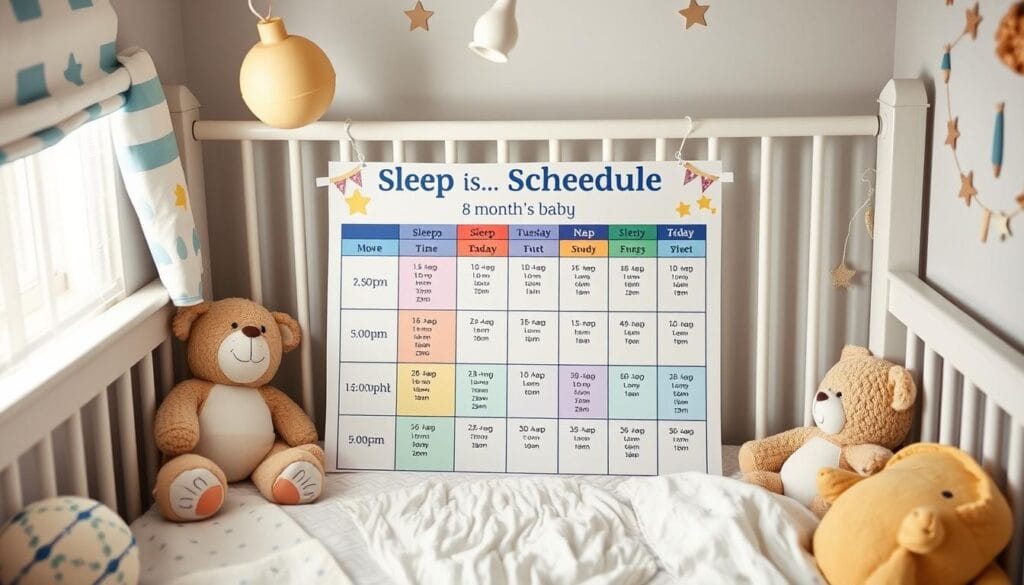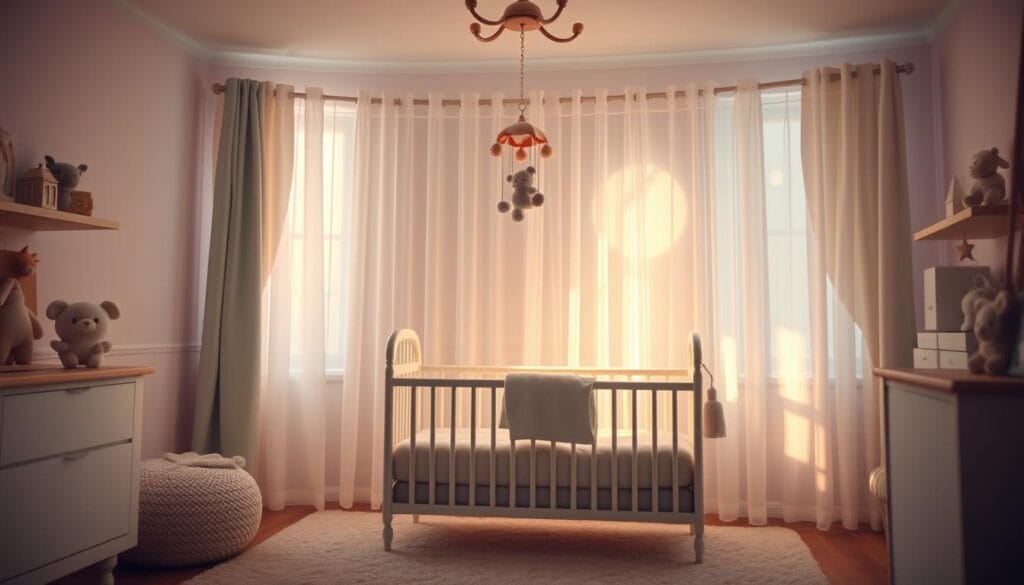As a new parent, you’re probably wondering about your baby’s sleep needs. A well-rested baby is happy and healthy. But how much sleep does an 8-month-old need? The answer is important for your child’s growth and your peace of mind.
Dealing with infant sleep can be tough. But you’re not alone. Let’s explore the key tips and strategies for your 8-month-old’s sleep needs.
Table of Contents
Understanding Sleep Patterns in 8-Month-Old Babies
As your 8-month-old baby grows, their sleep patterns change and get more regular. Knowing about normal sleep duration ranges, sleep cycle development, and signs of healthy sleep helps ensure they get enough rest.
Normal Sleep Duration Ranges
Experts say 8-month-old babies should sleep 12 to 16 hours a day, including naps. Many start sleeping through the night by 6 months. But, 8-month-olds might still wake up sometimes because of their unique sleep patterns.
Sleep Cycles and Development
By 8 months, your baby’s sleep cycles are getting more adult-like. They have a better mix of active (REM) and quiet (non-REM) sleep. This change can sometimes cause short-term sleep issues as they adjust.
Signs of Healthy Sleep Patterns
Healthy baby sleep duration at 8 months means they can calm down on their own, have regular nap times, and sleep longer at night. But, age-appropriate sleep patterns can change due to teething, emotional growth, and new physical skills. These changes might affect their sleep.
“Creating a consistent bedtime routine, providing a safe sleep environment, and encouraging self-soothing techniques can help manage any disruptions to your 8-month-old’s sleep patterns.”
How Much Should a 8 Month Old Sleep
When your baby is 8 months old, their sleep habits change. They need 12 to 16 hours of sleep each day. This includes 10-12 hours at night and 2-4 hours during the day.
At this age, most babies can sleep through the night without waking up for food. They usually sleep 9-12 hours straight. During the day, they take two naps, lasting 30 minutes to 2 hours. This helps them grow and develop well.
It’s key to have good sleep habits at this time. Babies this age should have wake windows of approximately 2.5-3.5 hours between sleep periods. Their last nap should end by 4:30-5:00 p.m. Bedtime is usually between 7:00-8:00 p.m.
“Consistent routines are crucial for 8-month-old babies to aid in daytime learning and growth, possibly helping them sleep better at night.”
Watch your baby’s cues to make sure they get enough sleep. Sleep schedules might need to change as they grow and become more active.
Creating a regular sleep routine and a good sleep environment is important. It helps your 8-month-old baby get the sleep they need to grow. Finding the right balance between night and day sleep is key for their health.
Optimal Sleep Schedule for Your 8-Month-Old
As your 8-month-old baby grows, finding the right sleep schedule is key. Knowing the best wake times, nap schedules, and bedtime routines is crucial. It helps your baby get the rest they need to grow and develop.
Morning Wake Windows
At 8 months, your baby should wake up for 2.5 to 3.5 hours in the morning. They usually take their first nap around 9:45 AM.
Nap Time Distribution
Most 8-month-old babies need two naps a day. The first nap is around 9:45 AM, and the second is at 2:30 PM. Each nap should last 1-2 hours, giving your baby 2.5-3.5 hours of daytime sleep.
Bedtime Routine Timing
The best bedtime for an 8-month-old is between 7:00-8:00 PM. Start the bedtime routine at 6:30 PM. This gives your baby a 3-3.5 hour wake window before bed, helping them sleep smoothly.
By sticking to this baby sleep schedule, your 8-month-old gets the rest they need for growth. Remember, every baby is different. Be ready to adjust the schedule as your child’s sleep needs change.

“Establishing a consistent sleep routine is essential for an 8-month-old’s overall well-being and development.”
Understanding Wake Windows at 8 Months
As your 8-month-old baby grows, their sleep-wake cycles and infant awake time change. Knowing their baby wake windows is crucial for their rest.
At 8 months, your baby’s wake windows are usually 2.5 to 3.5 hours. These times of being awake grow longer as the day goes on. The shortest is in the morning, and the longest is in the evening before bed.
- Newborns have very short 45-minute wake windows, which gradually increase to 2.5-3.5 hours by 8 months.
- Most 8-month-old babies sleep 10-12 hours at night and take two naps. These naps are about 2.5-3.5 hours of daytime sleep.
- It’s important not to let any one nap go longer than 2 hours. This can mess up the sleep-wake cycle.
Watching your baby’s sleep cues and respecting their wake windows helps avoid overtiredness. Adjusting wake windows as needed is key for healthy sleep-wake cycles in babies.

“Paying attention to your baby’s wake windows and responding to their sleep cues is the key to ensuring they get the rest they need to thrive.”
Nap Requirements and Transitions
At 8 months old, many babies start to drop from three naps to two. This change can be exciting but also challenging for parents. They need to find the best sleep routines for their growing baby.
Two-Nap vs. Three-Nap Schedule
Most 8-month-old babies do best with two naps. The first nap is in the mid-morning, and the second is in the early afternoon. Some babies might still need a short third nap, called a “catnap,” to help them sleep better before bedtime.
This catnap is usually 15-30 minutes long. It’s especially helpful on daycare days when the schedule can be different.
Optimal Nap Lengths
The best nap time for an 8-month-old is 60-90 minutes for the first two naps. This lets your baby sleep through a full cycle and wake up feeling refreshed. The catnap, if it’s needed, should be 30-45 minutes long. This keeps it from messing up their nighttime sleep.
Managing Nap Transitions
Switching from three naps to two can be tricky. To make the transition smooth, you might need to adjust how long your baby stays awake between naps. You might also need to put them to bed a bit earlier. This helps prevent them from getting too tired and ensures they get the right amount of 2-3 hours of total daytime sleep.
“Establishing healthy nap habits at 8 months is crucial for supporting your baby’s overall sleep quality and development.”
Creating the Perfect Sleep Environment
Creating a safe and comfy sleep space is key for your 8-month-old’s rest. You need a safe, cozy, and right nursery setup. Start with a firm, flat sleep surface like a crib or bassinet, and a tight sheet. Keep the room at 68-72°F for your baby’s comfort and safety.
For baby sleep safety, stay away from loose bedding, toys, and bumper pads in the crib. These can be dangerous. Go for a simple, clean nursery setup. Use blackout curtains to block out light during naps. Add white noise to cover up sounds that might wake your baby.
Being consistent is important for a good sleep space for infants. Always put your baby on their back to sleep. Make sure the sleep area is safe from dangers. These steps help create a safe and comfy space for your 8-month-old to sleep well.
“A well-designed sleep environment can make all the difference in helping your baby get the quality sleep they need.”
A peaceful and baby-proofed nursery is crucial for your 8-month-old’s growth. Focus on their sleep safety and make a calm place. This helps your baby sleep well, grow, and explore the world.
Common Sleep Challenges at 8 Months
As your 8-month-old baby grows, you might face some sleep issues. These problems are often linked to 8 month old sleep problems or baby sleep regression at this age.
Sleep Regression Signs
The 8-month sleep regression is caused by your baby’s fast brain growth. They might start crawling or pulling up. You might see more night wakings, nap resistance, and changes in sleep patterns. This can last from a few days to weeks.
Separation Anxiety
At 8 months, infant separation anxiety is common. Your baby might feel scared when you leave, leading to bedtime resistance and night wakings. A consistent bedtime routine and reassurance can help.
Development-Related Sleep Issues
Exciting milestones like crawling or standing can mess with sleep. Your baby might be too excited to sleep. Giving them time to explore during the day can help them sleep better.
Remember, these sleep issues are normal and short-lived. With patience, consistency, and flexibility, you can guide your 8-month-old through this exciting time.
Establishing Healthy Sleep Habits
Creating a bedtime routine is key for your 8-month-old. It’s important to set a regular sleep schedule and teach self-soothing skills. Put your baby down when they’re sleepy but still awake.
When your baby wakes up at night, give them brief reassurance. But don’t take them out of the crib. Being consistent helps your baby learn to fall asleep on their own.
Infant sleep training can help your baby sleep better. Follow a consistent sleep routine and respond calmly to night wakings. Every baby is different, so be patient and flexible.
A sleep-friendly environment is also crucial. Keep the nursery cool, dark, and quiet. Avoid too much stimulation before bed. Use a white noise machine or lullaby to help your baby relax.

2 thoughts on “How Much Should a 8 Month Old Sleep – Sleep Guide”
Comments are closed.